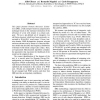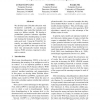15 search results - page 1 / 3 » Unsupervised Domain Relevance Estimation for Word Sense Disa... |
EMNLP
2004
13 years 6 months ago
2004
This paper presents Domain Relevance Estimation (DRE), a fully unsupervised text categorization technique based on the statistical estimation of the relevance of a text with respe...
ICAI
2004
13 years 6 months ago
2004
This paper presents a new method for Word Sense Disambiguation based on the WordNet Domains lexical resource [4]. The underlaying working hypothesis is tha...
BMCBI
2010
13 years 4 months ago
2010
Background: Word sense disambiguation (WSD) algorithms attempt to select the proper sense of ambiguous terms in text. Resources like the UMLS provide a reference thesaurus to be u...
ACL
2006
13 years 6 months ago
2006
Instances of a word drawn from different domains may have different sense priors (the proportions of the different senses of a word). This in turn affects the accuracy of word sen...
EMNLP
2007
13 years 6 months ago
2007
We develop latent Dirichlet allocation with WORDNET (LDAWN), an unsupervised probabilistic topic model that includes word sense as a hidden variable. We develop a probabilistic po...


